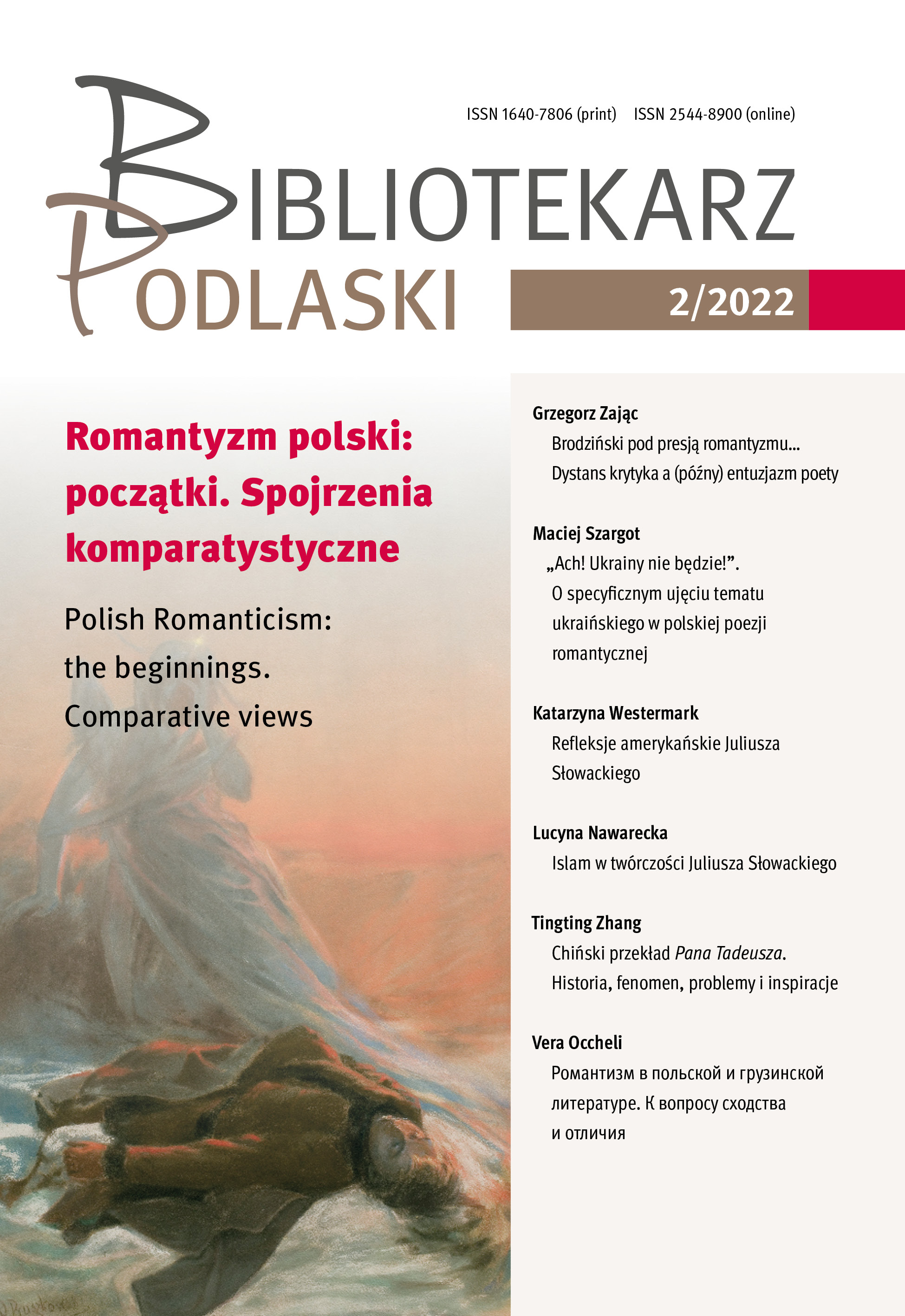Abstract
The aim of this paper is to describe the reception of the literature of Polish Romanticism in China, as well as its long and winding road to the Middle Kingdom. The article addresses the ideological beginnings of the existence of Adam Mickiewicz’s works in the consciousness of Chinese people. The author analyses two translations of Pan Tadeusz into Chinese, made during the first half of the 20th century. Information about Polish Romanticism and the works of its most eminent representatives reached China at a very crucial historical moment for the Middle Kingdom, almost immediately arousing the interest of the elites. However, the same historical causes that triggered the fascination with the works of the Polish Romanticists also led to a distortion and ideologization of its reception, which persisted until 1955, when the first translation of Pan Tadeusz appeared in Chinese. However, that translation was made from English and written in prose. This changed at the end of the 20th century, when a second translation of the poem, written in verse, appeared. Despite the passage of time and the efforts of translators, the reception of the literature of Polish Romanticism and the knowledge of Adam Mickiewicz's biography is still incomplete. On the other hand, this can be an impulse for further research in translation and literary studies.
References
Balcerzan E., Poetyka przekładu artystycznego, [w:] tegoż, Literatura z literatury. Strategie tłumaczy, Katowice 1998.
Barańczak S., Mały, lecz maksymalistyczny manifest translatologiczny, „Teksty Drugie” 1990, nr 3.
Berman A., Przekład jako doświadczenie Obcego, [w:] Współczesne teorie przekładu. Antologia, red. P. Bukowski, M. Heydel, Kraków 2009.
Brandes G., Indtryk fra Polen, Gyldendal, Kjøbenhavn 1888.
Brandes J., O poezyi polskiej w XIX stuleciu. Trzy odczyty, przeł. J. S., Warszawa 1887.
Brandes J., Polska, przeł. Z. Poznański, wyd. II, Lwów 1902.
Bończa Bukowski P. de, Od bliskości do obcości. Georg Brandes, Polska i kwestia żydowska, „Teksty Drugie” 2017, nr 5.
Jensen Ch. H., Georg Brandes and the literary debate in China during the transitional years, [w:] The Activist Critic. A symposium on the political ideas, literery methods and international reception of Georg Brandes, red. H. Hertel, S. Møller Kristensen, Copenhagen 1980.
Kleiner J., Mickiewicz, t. II, Dzieje Konrada, cz. II, Lublin 1998.
Li Y, Recepcja literatury polskiej w Chinach: teoria i dzieje, „Postsrciptum Polonistyczne” 2016, nr 2(18).
Lu X., O sile poezji demonicznej, (chin.《摩罗诗力说》, mó luó shī lì shuō), [w:] tegoż, Dzieła wszystkie, (《鲁迅全集》), People's Literature Publishing House (人民文学出版社), Pekin 1981, t. 1.
Michalik J., Korespondencja Jerzego Brandesa z Polakami w Bibliotece Jagiellońskiej, „Biuletyn Biblioteki Jagiellońskiej” 1972, XXII.
Mickiewicz A., Do Franciszka Mickiewicza, Paryż, 19 kwietnia 1834 r., [w:] tegoż, Dzieła, Wydanie Rocznicowe, t. XV.
Miłosz Cz., Ziemia Ulro, Kraków 2000.
Phillips U., Adam Mickiewicz 1798–1855, [w:] Encyclopedia of Literary Translation into English, red. O. Classe, London: Taylor & Francis, t. 2.
Poznański Z., Słowa tłumacza do drugiego wydania polskiego przekładu Polski, [w:] J. Brandes, Polska, przeł. Z. Poznański, wyd. II, Lwów 1902.
Przyboś J., Czytając Mickiewicza, Kraków 1950.
Rodziński W., Historia Chin, Wrocław 1974.
Shan K., Liu W., Niezłomny rewolucjonista, wielki poeta. Ku pamięci Adama Mickiewicza z okazji 145 rocznicy śmierci poety, https://www.doc88.com/p-0187412829235.html?s=rel&id=2, dostęp: 20-03-2017.
Sławińska I., Chińscy miłośnicy Adama Mickiewicza, „Rocznik TLiAM” 1994, t. 29.
Sun Y., Posłowie, [w:] Mi Ci Kai Wei Zhi, Ta Du Xu Xiansheng (chin.:《塔杜须先生》, tytuł pierwszego przekładu Pana Tadeusza A. Mickiewicza po chińsku) przeł. Sun Yong, People’s Literature Publishing House (人民文学出版社), Pekin 1955.
Tomkowski J., Pan Tadeusz, poemat metafizyczny, Wrocław 2019.
Venuti L., Przekład, wspólnota, utopia, [w:] Współczesne teorie przekładu. Antologia, red. P. Bukowski, M. Heydel, Kraków 2009.
Wu L., Adam Mickiewicz w Chinach, [w:] Z notatnika tłumacza literatury polskiej i chińskiej, Gdańsk 2019.
Yi L., Jego blask jak słońce i księżyc. Ku pamięci Adama Mickiewicza w 140 rocznicy śmierci poety, „Dong Ou” 1995, nr 3.
Yi L., Literatura polska na świecie, t. III, red. R. Cudak, Katowice 2010.
Yi L., Recepcja literatury polskiej w Chinach, [w:] Literatura polska w świecie, t. III, red. C. Romuald, Katowice 2010.
Yi L., Wstęp, [w:] Ta Du Shi Xian Sheng (chin.: 《塔杜施先生》, tytuł chińskiego tłumaczenia Pana Tadeusza), tł. Yi Lijun, Sichuan Literature and Art. Publishing House, Chengdu 2016.
Articles published in the “gold open access” mode on the basis of a non-exclusive license agreement between the publisher and the author. Permitted use:
- the publication may be read and stored on any device,
- the publication may be cited (with obligatory reference to the author, the title of the text, as well as the full title, bibliographic address of the issue and page of the journal)
The editorial team of “Bibliotekarz Podlaski” implements an open access policy by publishing materials in the form of the so-called Gold Open Access. From volume 42 (issue 1/2019), the journal is available under the Creative Commons license (Attribution – ShareAlike: CC BY-SA).
The key declarations of the Open Access and Open Science movement, which we fully support, are available on the CEON Open Science website.
COPYRIGHT:
The editorial team of “Bibliotekarz Podlaski” implements an open access policy by publishing materials in the form of the so-called Gold Open Access. The journal is available under the Creative Commons license – Attribution – ShareAlike 4.0: International: CC BY-SA 4.0).
The key declarations of the Open Access and Open Science movement, which we fully support, are available on the CEON Open Science website.
“Bibliotekarz Podlaski” allows its readers to read, download, copy, distribute, print, search and link to the full content of articles. We enable full, immediate, unlimited (both in a territorial, temporal and technical sense) open access to all published content, in accordance with the principle that freely available research increases and accelerates the global development of science and the exchange of knowledge.
The editorial team of “Bibliotekarz Podlaski” encourages authors to place articles published in the journal in open repositories (after the review or the final version of the publisher), provided that a link to the journal’s website is provided.
The journal does not charge the authors any fees for accepting and publishing their texts.


